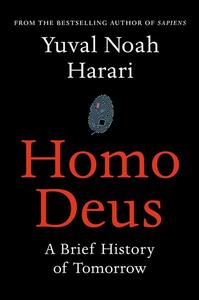Take a photo of a barcode or cover
challenging
informative
slow-paced
Twenty percent in I got tired of unsupported, inaccurate pseudo intellectual ramblings.
The first chapter is a condensed summary of the previous book. A little annoying if, like me, you had just finished the previous book, but I can see why it would be necessary, as this book would make less sense without that foundation.
The book talks allot about the nature of ideology and religion, and it got me thinking:
Is science just another religion? It has it's dogmatists and it's innovators, it's wrong about some things and it's right about some things. What is its distinguishing feature? It's true? Most good scientists will admit that they probably are wrong about some things. It works? So does religion; Religion unites, gives meaning, provides many social functions and services, Christianity in particular conquered the globe, and birthed science, capitalism, and liberalism, all of which have out performed all other ideologies and systems. Therefore it can be said that Christianity out performed it's own competition. Can it not be said therefore to have 'worked'? What is the yardstick for whether or not something is working? Science: Aeroplanes fly, computers compute - it works. Christianity: We conquered the globe, and birthed all the worlds most effective ideas and systems - it works.
Author claims that we are witnessing the death
of humanism in general,
and it's most successful manifestation in particular,
liberalism,
including the version of it that Carl Benjamin
would describe as 'Classical English Liberalism',
and which he seems to define in pretty much the same way.
Yuval seems to think that this means that something new will come to replace it.
He claims in the final chapters that 'Dataism' will be the new ideology. The basic idea here is that where Humanism worships humanity, Dataism worships data. If he is right then the current squabbles between 'left' and 'right' are about to be swept aside by a tidal wave of dangerous new ideas that neither of them can see coming, where human rights are discarded and equivalent rights and protections will instead be given to data itself. He actually does make some convincing arguments for this, and the way he defines and analyses ideology and religion make this book worth reading even if you are not convinced by his prophecies.
The book talks allot about the nature of ideology and religion, and it got me thinking:
Is science just another religion? It has it's dogmatists and it's innovators, it's wrong about some things and it's right about some things. What is its distinguishing feature? It's true? Most good scientists will admit that they probably are wrong about some things. It works? So does religion; Religion unites, gives meaning, provides many social functions and services, Christianity in particular conquered the globe, and birthed science, capitalism, and liberalism, all of which have out performed all other ideologies and systems. Therefore it can be said that Christianity out performed it's own competition. Can it not be said therefore to have 'worked'? What is the yardstick for whether or not something is working? Science: Aeroplanes fly, computers compute - it works. Christianity: We conquered the globe, and birthed all the worlds most effective ideas and systems - it works.
Author claims that we are witnessing the death
of humanism in general,
and it's most successful manifestation in particular,
liberalism,
including the version of it that Carl Benjamin
would describe as 'Classical English Liberalism',
and which he seems to define in pretty much the same way.
Yuval seems to think that this means that something new will come to replace it.
He claims in the final chapters that 'Dataism' will be the new ideology. The basic idea here is that where Humanism worships humanity, Dataism worships data. If he is right then the current squabbles between 'left' and 'right' are about to be swept aside by a tidal wave of dangerous new ideas that neither of them can see coming, where human rights are discarded and equivalent rights and protections will instead be given to data itself. He actually does make some convincing arguments for this, and the way he defines and analyses ideology and religion make this book worth reading even if you are not convinced by his prophecies.
At times amazingly insightful and thought provoking , at others repetitive and full of sweeping generalizations and oversimplifications.
Home deus is like a good conspiracy theory, it may ring of the truth, it may not, but one thing it promises to everyone who chooses to engage with an open mind ... a fresh perspective.
Home deus is like a good conspiracy theory, it may ring of the truth, it may not, but one thing it promises to everyone who chooses to engage with an open mind ... a fresh perspective.
God is dead. God remains dead. And we have killed him. How shall we comfort ourselves, the murderers of all murderers? What was holiest and mightiest of all that the world has yet owned has bled to death under our knives: who will wipe this blood off us? What water is there for us to clean ourselves? What festivals of atonement, what sacred games shall we have to invent? Is not the greatness of this deed too great for us? Must we ourselves not become gods simply to appear worthy of it?
You know who
Harari enjoys speculative writing, and what is the future if not speculation? Homo Deus is a futuristic tour de force, just as improbable as unprovable. It's no short of generalisations, it's guilty of blatant reductionism and oftentimes being excessively verbose just to drive some argument home. The reader may be fooled, will surely lose touch with common sense, but will never get bored.
Harari is a master storyteller, his tale is of mankind, of what has passed and what is yet to come. So he starts from the past, reiterating many of his well-received concepts from Homo Sapiens, and leads the charge into the unknown. He's not afraid of ridiculous claims, he almost enjoys them, and wisely enough he talks lighthearted with a pinch of self-irony, a straight face might be too much when discussing dataism, but hey, we too are lost in the fog of technology.
Harari is a dreamer, and what is the future if not a dream? Homo Deus is a warning, beware of your dreams for they may come true. It indulges the wildest fantasies but never forgets to step back and scrutinise the utopian expectations of the sci-fi land of milk and honey. Salvation is close, but as we reach for the tree of knowledge and life, just as we storm the gates of Eden, about to take it back by force and intelligence, our mission on Earth may be over.
Marvelous book, but a bit repetitive.
Raises a lot of questions and interesting thoughts.
Raises a lot of questions and interesting thoughts.
informative
reflective
slow-paced
Que livro amigos, que livro. Não lembro do que li que me fez pensar tanto e mudar a forma como vejo o mundo. Uma ótima análise rápida sobre como chegamos aqui, que se conecta muito bem com o [b:Sapiens: A Brief History of Humankind|23692271|Sapiens A Brief History of Humankind|Yuval Noah Harari|https://d.gr-assets.com/books/1420585954s/23692271.jpg|18962767], e uma análise mais extensa sobre para onde podemos ir. A análise em terceira pessoa sobre humanismo, capitalismo e tendências futuras é excelente. E a reflexão que ele traz sobre os valores que damos para o valor individual, consciência e autonomia só deve ganhar importância nos próximos anos. E tudo isso em uma linguagem acessível e ao alcance de qualquer audiência. Com certeza algo que vou reler muito ainda.
p.s. O livro sai em alguns meses ainda, tive a oportunidade de fazer a revisão técnica da versão em português.
p.s. O livro sai em alguns meses ainda, tive a oportunidade de fazer a revisão técnica da versão em português.
A book, just like Sapiens, that everybody should read just to get different perspectives. I think Harari has a great ability to synthesize and express ideas in accessible ways. I have thoroughly enjoyed both books.




